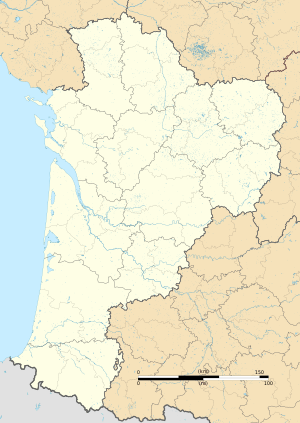Curemonte
| Curemonte | ||
|---|---|---|
| Commune | ||
|
The Château des Plas, in Curemonte | ||
| ||
 Curemonte Location within Nouvelle-Aquitaine region  Curemonte | ||
| Coordinates: 45°00′00″N 1°44′27″E / 44.9999°N 1.7409°ECoordinates: 45°00′00″N 1°44′27″E / 44.9999°N 1.7409°E | ||
| Country | France | |
| Region | Nouvelle-Aquitaine | |
| Department | Corrèze | |
| Arrondissement | Brive-la-Gaillarde | |
| Canton | Midi Corrézien | |
| Intercommunality | Villages du Midi Corrézien | |
| Government | ||
| • Mayor (2014–2020) | Marie-Claude Pécouyoul | |
| Area1 | 8.83 km2 (3.41 sq mi) | |
| Population (2015)2 | 213 | |
| • Density | 24/km2 (62/sq mi) | |
| Time zone | UTC+1 (CET) | |
| • Summer (DST) | UTC+2 (CEST) | |
| INSEE/Postal code | 19067 /19500 | |
|
1 French Land Register data, which excludes lakes, ponds, glaciers > 1 km2 (0.386 sq mi or 247 acres) and river estuaries. 2 Population without double counting: residents of multiple communes (e.g., students and military personnel) only counted once. | ||
Curemonte is a commune in the Corrèze department in central France. It is a medieval village characterised by its three castles. In a fortified position on a ridge overlooking a valley on both its eastern and western flanks, the village has historically had a strategic importance in the area. Its inhabitants are called Curemontois.
Geography
Location
The municipality of Curemonte is located at the southern end of the department of Corrèze.

Physical geography
The village of Curemonte is built on a ridge line that overlooks the valleys of the Sourdoire and the Maumont.
Population
| Historical population | ||
|---|---|---|
| Year | Pop. | ±% |
| 1962 | 351 | — |
| 1968 | 311 | −11.4% |
| 1975 | 248 | −20.3% |
| 1982 | 231 | −6.9% |
| 1990 | 203 | −12.1% |
| 1999 | 223 | +9.9% |
| 2008 | 213 | −4.5% |
History
The existence of Curemonte is confirmed from 860.
It was in the 11th century that the village flourished, passing through the Viscounts of Turenne.
Places and monuments
- It is ranked among the most beautiful villages in France.
- It has three castles:
- Château de Plas;
- Château de Saint-Hilaire;
- Château de la Johannie.
- It has three churches:
- Church of Saint-Barthélemy du Bourg;
- Church of Saint-Hilaire de la Combe: 11th Century Romanesque church, one of the oldest in the department, which was probably built on Merovingian foundations;
- The church of Saint-Genest: former parish church, now a Museum of Religious Art.
Châteaux de Plas et de Saint-Hilaire. Church of Saint-Barthélemy. Church of Saint-Hilaire de la Combe.
See also
References
| Wikimedia Commons has media related to Curemonte. |
.svg.png)